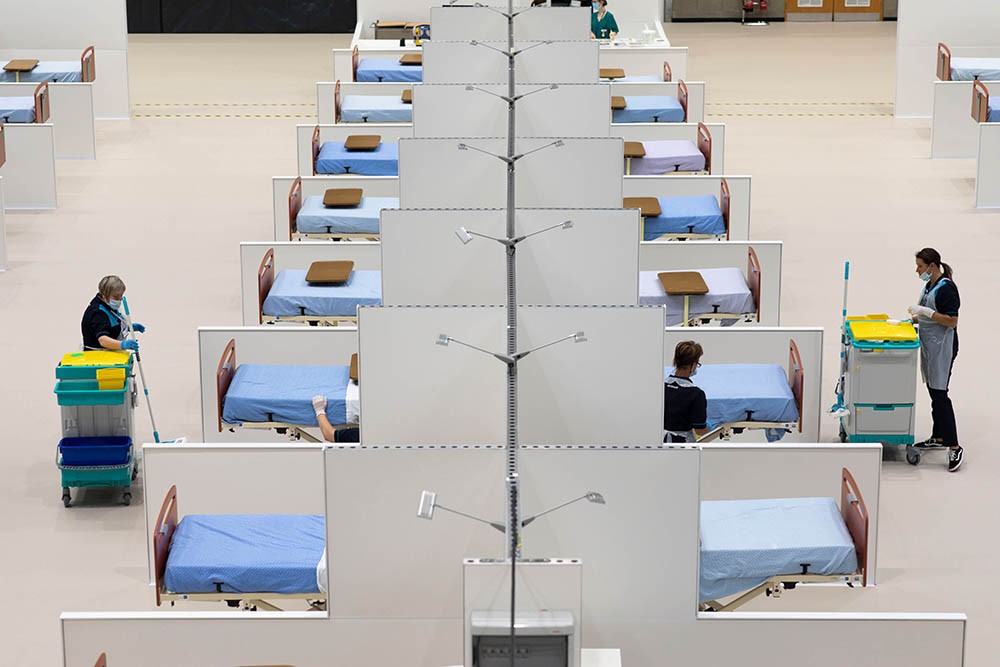
The UL Hospitals Group (ULHG) Intermediate Care Facility (ICF) at the University of Limerick is to close today, Friday October 23rd, after almost five months of providing step-down rehabilitative care for non-COVID-19 patients.
All ULHG staff who were redeployed to the temporary hospital facility in early June will be initially reassigned to University Hospital Limerick to support the phased opening of a brand new 14-bed block at the region’s main acute hospital.
Discharges of patients from the ICF have been ongoing, and the five patients remaining in the facility this Friday afternoon will be transferred for ongoing care within the Hospitals Group.
The ward block at UHL, developed as part of the Government’s national action plan for the pandemic. is a rapid-build construction project overseen by HSE Estates, creating 14 single-room en-suite beds over two storeys.
Staff reassigned from the ICF will support the staffing of the new beds, which will be used for the treatment of COVID-19 patients at UHL. Seven of the beds will open today (Friday), with the remaining beds to be opened over the coming days.
The ICF grew out of the collaborative relationship between UL Hospitals Group and the University of Limerick, and was developed as a contingency solution to the patient flow and crowding challenges experienced in the region’s hospitals during the pandemic.

A total of 188 patients approx. benefitted from rehabilitation at the ICF between June 8th and October 23rd, with rostered 24-7 cover provided by a workforce of some 70 UL Hospitals Group personnel, including consultant physicians, Non-Consultant Hospital Doctors (NCHDs), an Assistant Director of Nursing, Nursing staff, Health Care Assistants (HCAs, including medical and nursing students), Clinical Nurse Managers, a Ward Clerk, Patient Advocacy Liaison Service (PALS), a receptionist, catering, security personnel and porterage for day and night, and hygiene staff. The multi-faceted Allied Health team included Clinical Nutrition & Dietetics, Medical Social Work, Occupational Therapy, Physiotherapy and Speech & Language Therapy, supported by students of Clinical Nutrition & Dietetics, Physiotherapy and Speech & Language Therapy from UL.
Margaret Gleeson, Chief Director of Nursing & Midwifery ULHG, said: “I’m immensely proud of the way all staff redeployed and embraced a new and challenging situation in a way that delivered enormous benefits for the patients we cared for.”
Yvonne Young, Assistant Director of Nursing at the ICF, said: “The ICF was more than a mere unit. It was something truly special—a hospital without doors, with the patient at the centre of a multidisciplinary team in which everyone had a voice. It was a very open facility in layout, and in spirit, where the ethos at all times was kindness. I’ve never experienced anything quite like it, and I feel the staff benefited as much as the patients. I’m hopeful that we can learn from this model of care for the benefit of all our hospitals,” she added.
Allied Health Group Lead, Fiona Steed, said: “The ICF has been a unique rehab care experience for Allied Health Staff and students alike. The interdisciplinary working between all staff—Allied Health, nursing, medical and support staff—was fantastic, leading to enhanced patient care. I would like to complement our staff, and staff from the School of Allied Health in UL, all of whom took to this unique opportunity with such enthusiasm, professional and dedication to the patient. The ICF allowed for the clinical placements for 33 students, with significant benefits for all with regard to inter-professional education.”

Professor Paul Burke, Chief Academic Officer of UL Hospitals Group and Vice Dean of Health Sciences at UL, was executive lead on the ICF project. Prof Burke applauded the collaborative spirit in which nursing, medical, allied health and support staff had wholeheartedly embraced the ICF model of care: “The ICF has been a hugely positive experience for all involved, including many nursing and medical students who worked in the ICF as health care assistants.
It was also a very successful bridge between ULHG clinicians and the students from UL’s School of Allied Health Sciences (AHS) many of whom were able to complete their formal training placements while working in this uniquely positive environment. The model of joint care in the ICF, provided by the different AHS groups in conjunction with doctors and nurses, is a model that I hope will be retained in UL Hospitals. It has provided extraordinarily engaging learning opportunities for students, and benefited patients and staff alike. It has been a privilege to witness this project come to fruition, with tangible benefits for all, and I would like to thank everyone involved in making it possible.”
UL Hospitals Group CEO Colette Cowan paid tribute to all involved in making the ICF concept a reality, particularly the Group’s academic partner, the University of Limerick: “The ICF was a vital strategic element in our efforts to manage patient flow at this unprecedented and challenging time. We could not have done it without the generosity of our academic partner in providing the space for the facility.”
“I would also like thank HSE Estates for managing the delivery of the project, with valuable input from UL’s Building and Estates Department, contractors and suppliers, Limerick City and County Council, and Defence Forces personnel from Limerick and Cork,” Ms Cowan said. “I’m also incredibly proud of our staff, supported by students from UL, who readily redeployed into an unfamiliar work environment that proved to be such an effective model of care and one that benefited personnel and patients alike. Thank you all.”
UL President, Professor Kerstin May said: “We have a very significant and valuable partnership with University Hospital Limerick as well as a strong commitment to our Mid-West community. The Intermediate Care Facility at UL was an example of a very collaborative multi organisational solution to serve our community at an anxious and difficult time.
Our students in many health disciplines had opportunities to experience excellent practice-based education and inter-professional collaboration at the facility and to be involved in giving care to patients with complex needs.”